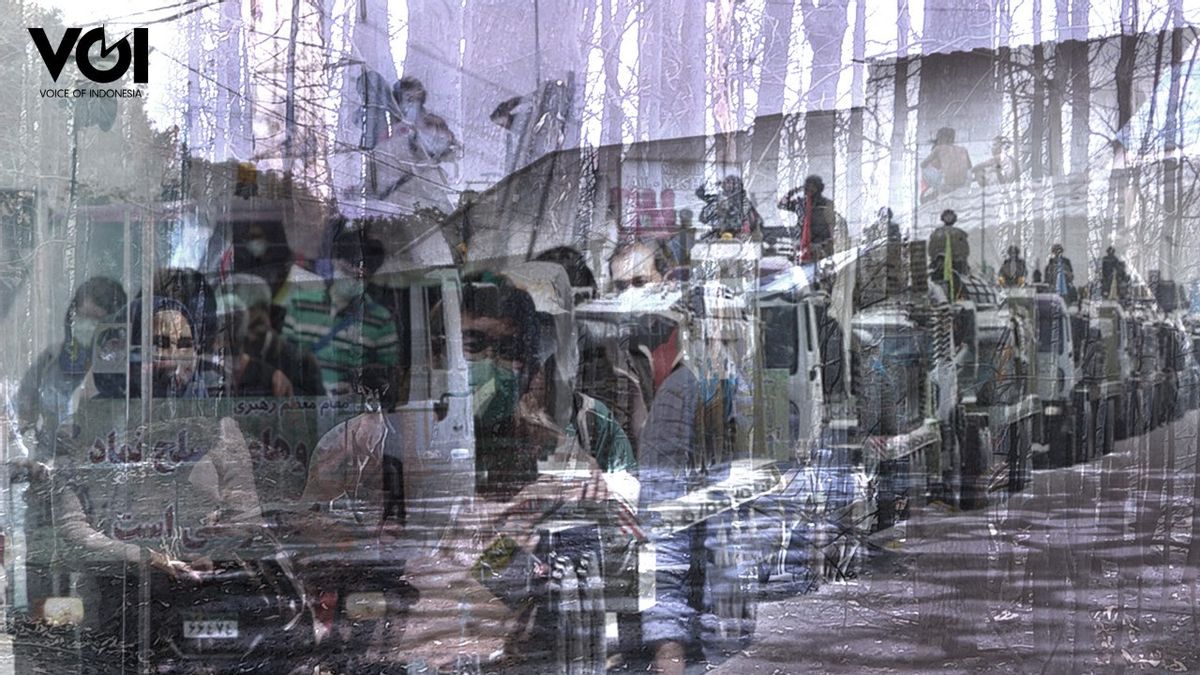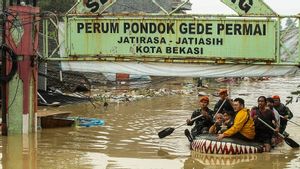JAKARTA - Large floods in Jakarta and its surroundings, forest fires in Australia, the conflict between the United States and Iraq, and the spread of the corona virus, which has become the world's deadliest disease outbreak. 2020 has just entered its first month. It's been a tough month to go through. Unfortunately, we were even able to construct a kind of 'black kaleidoscope' just from events that took place in January.
Australian bushfires

"We need a lot to get closer to God and improve our relationships with others and nature," said an office colleague on the ninth day of January.
He made this expression after we discussed the spread of forest fires in Australia. Based on information that day, Australian forest fires have killed 27 people. One billion animals died, ranging from birds to reptiles and mammals, including two species endemic to Australia, kangaroos and koalas which are threatened with extinction due to fire. Two thousand houses were destroyed. New South Wales is the worst affected area with a record of 4.9 billion hectares affected.
Fires are nothing new to Australia. Every year, Australia is hit by fires. The cause, all kinds. Hot temperatures to a flash of lightning can ignite the fire. Apart from natural causes, human activity is also the cause. The forest fires this time have actually occurred since July 2019. The fires got worse towards the end of the year and continued to worsen into 2020. On January 5, the fires even caused Australia's skies to turn orange.
This fire was also recorded as the worst in Australian history, after the Black Saturday that occurred in 2009. Forest fires sparked hot temperatures of up to 40 degrees Celsius or 113-120 degrees Fahrenheit. The cause of the worst of the fires this time is a long - also unprecedented - drought that swept across the country. Of course, humans took part in this disaster. Police have arrested 183 people as of January 9.
For us, there is nothing more terrible than wildfires. Without forests, there will be no oxygen. How can we live without oxygen?
Early flooding of the year

New year's eve, heavy rain flushed Jakarta and a number of surrounding areas. The rain is said to be one of the worst. Monitoring in Taman Mini, East Jakarta captured rainfall up to 335 millimeters. While the highest monitoring was arrested at Halim Perdanakusuma, East Jakarta: 377 millimeters. The Meteorology, Climatology and Geophysics Agency (BMKG) recorded the highest rainfall ever occurred in 2007 at 340 millimeters per day.
In the morning, Wednesday, January 1, Jakarta was flooded. A number of capital buffer areas - from Tangerang, Depok to Bekasi - were also flooded. The latest data compiled by the National Disaster Management Agency (BNPB) as of January 4 calculated the impact of the floods that inundated 308 urban villages with various water levels, from 25 centimeters to the highest reaching six meters. The flood also caused 60 people to die and 92,621 others fled to 189 scattered evacuation points.
Geospatial expert, Bintang Rahmat Wananda analyzed this flood. According to him, flooding is a disaster that does not recognize a single factor as the cause. That also happened in early 2020. According to him, the first factor was the lack of water absorption in the southern area of Jakarta - as the upstream. In fact, the upstream area is very important to absorb surface water due to high rainfall.
In addition, the lack of blue open space (RTB) is also the cause. It is considered that Jakarta does not have an adequate place to park water before it flows into the sea. Land subsidence factors and poor surface water management systems are other causes. "Each settlement should be obliged to have some kind of resistance pool to accommodate water and this is made systemic through government regulations," said Bintang as quoted from Tirto, Tuesday, January 28.
All of these causes have worsened natural conditions, which are increasingly showing signs of damage due to climate change. As revealed by BMKG Deputy for Climatology, Herizal, that climate change is exacerbating potential disasters that occur. No exception, the floods in early 2020. According to the statistical analysis of rain conducted by BMKG, climate change has led to an increase in patterns of rain intensity over the past 150 years.
"This indicates that heavy rains, which were rare in the past, are now more likely to be present in the current natural conditions," he said.
The threat of world war

Jakarta is still flooded. Australian forests are still burning. In the Middle East, an air strike by United States (US) forces killed General Qaseem Soleimani. The leader of Iran's elite Quds force was killed by a US troop missile on Friday, January 3. The attacks were carried out on the orders of President Donald Trump.
Iran is outraged. The war drums were beating. The red flag is raised in the holy city of Qom. This is the first time in history that Iran has raised a red flag at the Grand Mosque of Jamkaran which is a Shiite pilgrimage site. According to Shia tradition, the red flag is a symbol of revenge for the unjustly shed blood.
Iranian Revolutionary Guards spokesman Ramezan Sharif also called for retaliation. In Iran's national television broadcast, he said: The Revolutionary Guards, the wise Iranian nation and the resistance front in the vast Muslim world will avenge this martyr's blood (Soleimani).
The world was engulfed in fear of the outbreak of a third world war. Iran's allies, China and Russia also commented. China urges the US to abandon the path of violence. Meanwhile, the Russian Foreign Ministry reminded the US of the possible consequences related to increasing tensions in the Middle East region.
Fears of an outbreak of a world war grew stronger when Iran attacked the joint US-Iraqi air base in Ayn al-Asad, Western Iraq on Wednesday, January 8. Iran's Revolutionary Guards confirmed the attack was in retaliation for Soleimani's death. "The Iranian Revolutionary Guard announced to the US that this response will be full of 'pain' and 'destruction'," wrote the Iranian Revolutionary Guard as reported by Bloomberg.
The heating up of these conditions also causes disaster for a flight. A Ukrainian Boeing 737 was subjected to a misfire on Wednesday morning, January 8. 176 died in the tragedy. The Iranian military admits its mistakes. They also dragged the US into the tragedy. According to Iran, interference with US electronic interference had caused missile operators to mistake the Ukrainian passenger plane as a US cruise missile.
Corona virus

December 31, 2019, the Public Health Commission of Wuhan, China reported an outbreak of the disease. The plague was said to be similar to pneumonia. When the initial detection was detected, the authorities recorded 27 cases where the victims were confirmed positive. Then, January 9, scientists identified the virus that was causing the outbreak as a new type of corona. The virus reminds many people of the SARS outbreak that broke out in China in 2002.
The most basic similarity is how viruses pass from animals to humans. In the case of the corona virus, bats are said to be the main transmitters of the virus. The Chinese people's habit of consuming wild animals - including bats - is said to be the main cause of transmission. This suspicion is reinforced by the fact that the Huanan Seafood Market in Wuhan was the first location for the virus to spread.
January 12, the Chinese government announced the death of a 61-year-old man in Wuhan as the first death related to the coronavirus. The man is said to have died after three days of being infected. A day later, the authorities officially announced that the virus had spread to other countries. Thailand is the first country outside China to report case findings. Furthermore, the corona virus was discovered in Japan before other findings were reported in South Korea and Taiwan.
Furthermore, the authorities isolated Wuhan City. As of Monday, January 27, isolation is still in effect. Not a single person was allowed to leave or come to Wuhan. Panic began to set in as logistics supplies ran low in the city. Data compiled from the gisanddata.maps.arcgis.com site shows that the spread of the corona virus as of today, Tuesday, January 28 at 15.53 WIB has touched 19 countries.
In details, China with the findings of 4,409 cases, Hong Kong and Thailand with eight cases, Macau with six cases, Australia, the US, Taiwan and Singapore with five cases. Japan, Malaysia, South Korea both recorded four case findings, France three cases, and Vietnam with two cases. There were fewer cases recorded in Cambodia, Canada, Germany, Ivory Coast, Nepal and Sri Lanka which both recorded one case.
Referring to the same data source, the corona virus has killed 107 people, of which all the deaths have occurred in China. In Indonesia, the authorities have not found a single case to date. Preventive measures were taken by increasing surveillance at airport gates, issuing travel warnings to China, and using evacuation capsules.
It weighs January
January is a tough month. This impression was not only captured by us reporters who daily struggled with the swift flow of information. Through questionnaires that we throw on social media, in fact we catch the same feelings that are captured by netizens. Most of them reveal the severity of the test that the citizens of the world have to endure for this month.
The Twitter account @encrypttt, for example, answered, "It's really hard to swear. It's not even half as heavy as carrying a sin."
Or the @CutMelisa_ account which captures lots of inquiries from various events that occurred throughout January. "There are so many mysteries and puzzles about this early 2020 incident."
The @mazzini_giusepe account describes similar feelings. "It's awful and alarming."
One word for this month. pic.twitter.com/Vplioj9shR
- voi.id (@voidotid) January 28, 2020
Even on Instagram we catch the same anxiety. We asked the question, "How Hard is January for You in terms of Events in the World?"
The @datikabunga account replied: It's really hard, really. I do not expect, it has not been completed in January, there have been many trials.
@ignacina, replied: It's not heavy. Big slap from nature to humanity. Should have done better care for nature.
Another, @yosafatmilala described the weight of the burden in January which he even called the burden of the full year 2019.
"2020 is only until January but the load is comparable to last year's 2019," he said.


The English, Chinese, Japanese, Arabic, and French versions are automatically generated by the AI. So there may still be inaccuracies in translating, please always see Indonesian as our main language. (system supported by DigitalSiber.id)









